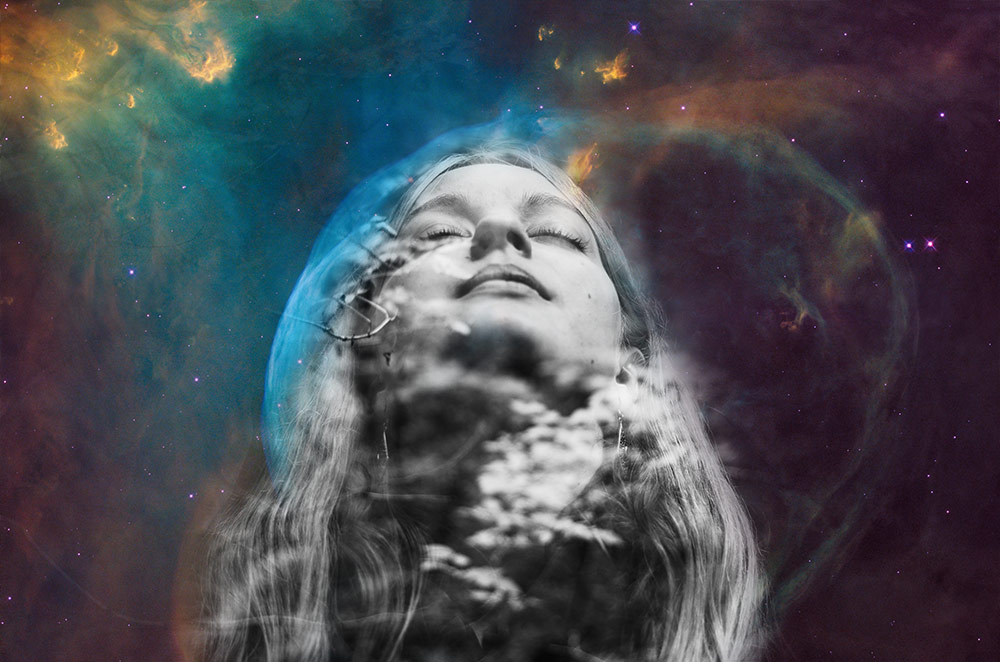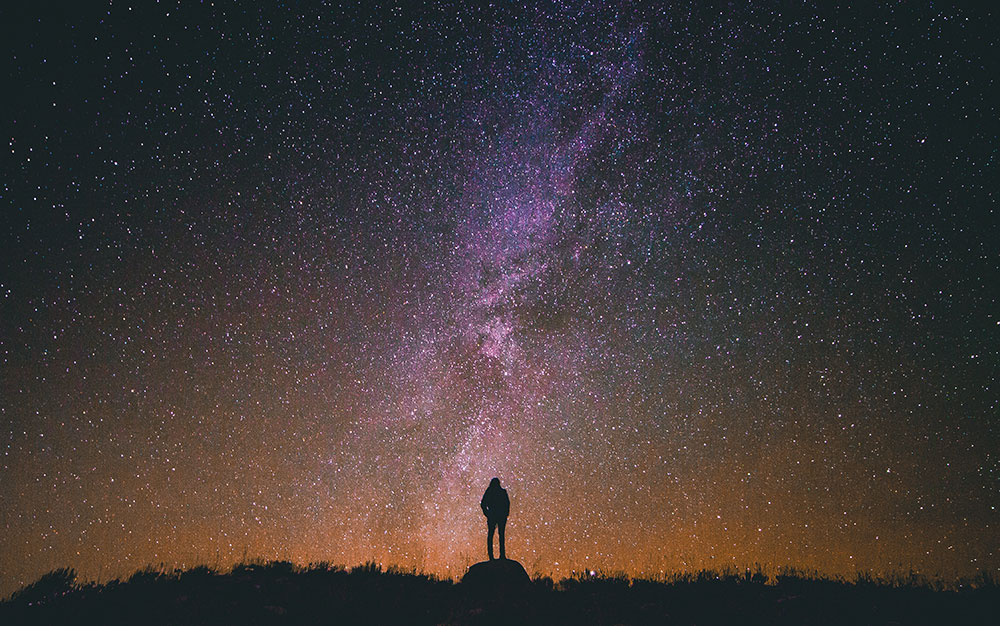Opening Yourself to Infinite Possibility:
The Spiritual Keys to Finding Your True Self
BY DEREK RYDALL
 finding and embodying your true self allows you to tap into the realm of infinite possibility and potential. photo: phoenixie photocase.com
finding and embodying your true self allows you to tap into the realm of infinite possibility and potential. photo: phoenixie photocase.com
Close your eyes for a moment and picture a one-month-old baby in a yellow onesie with rabbits embroidered on it. The baby is sleeping, perhaps being cradled softly to someone’s chest. Hold that image in your mind and notice what you’re thinking about it. How do you feel toward this child? What do you think of it’s true self?
Are you thinking, “She’s so weak, so incapable, and really needs to lose a couple inches around the thighs…” Or, “His hair is thinning, he doesn’t even have any teeth yet, all he does is eat and sleep, when is he going to makes something of himself, he’s such a burden…”
Sounds ridiculous, huh?
Yet that’s how we view our true selves as we grow up and become hypnotized by the cultural beliefs about what constitutes worth, value, and success. We begin to compare ourselves (and others) to everyone else until we have all but lost this awareness of our inherent innocence and perfection.
But there’s a place within your true self that has never stopped seeing yourself through the eyes of love, just as parents see their newborn children. This is the divine within, the presence that eternally holds you in its arms and knows the truth of your perfection. Reconnecting to this original truth is the foundation of Emergence. Without this innate perfection as our starting premise, nothing we do will ever bring us the freedom and fulfillment we seek, but will put us on a never-ending treadmill trying to fix, change, or improve what we think is wrong or lacking in order to finally be “enough.”
My client Bonnie understood this never-ending struggle. A little dynamo, Bonnie was always in motion: a do-gooder, a go-getter, and a caretaker all at once. Don’t get me wrong, she is a great person—but a lot of her drive was motivated by the false belief about her true self that she wasn’t enough, and that if she could just be more or do more, she would finally become a successful version of herself.
“I just need to figure out how to get this business going,” Bonnie said to me in one of our initial phone sessions. “I’m about to lose my house and, if I do, I don’t know where on earth me and my kids will go. I’ve tried so many things, I’ve spent so much money—money I didn’t have—and my life still isn’t working out. I don’t know why I get myself into these messes—what am I missing that everyone else seems to understand?”
She was near tears as she spoke. I could hear the history in her voice; the subtext was thick, every word weighted down by a story of struggle, of her trying to discover ‘my true self.’ Before she finished her sentence, I knew where it was going. I’ve worked with many people in this situation, and the request is always some version of the same thing: Can you help me figure out how to bring more money in? But I’ll let you in on a little secret: money is rarely, if ever, the issue—even when it is.
“My life doesn’t work” was the real issue. Which was a euphemism for “I don’t work. I’m broken. Something is wrong with me. And I’m afraid it’s not fixable, that I’m not good enough or worthy enough to get what I really want and need.” Bonnie is a strong woman with a gentle soul, who had been beaten down by circumstances and lost sight of her true spiritual self. It’s a place we can all recognize, a place we’ve all lived—many of us still keep a change of clothes there. She just wanted to get out from under the pain, to get a little ahead of the game, to have some assurance that her children would be okay—and, for the love of God, to finally be able to sleep through a single night.“First, I’m really sorry you’re going through this,” I said. “It sounds like you’ve been working really hard. You’re obviously a good mother.”
She held her breath. Then her breathing became shallow, more labored. After thousands of hours listening to clients on the phone, I’ve developed an ability to read not only the story in their voice but the meaning in their breathing. Words are powerful clues, but the spaces between the words are often even more potent. It was obvious she didn’t think that highly of her true self. But it was deeper than that. I could sense the guilt and shame she carried; she felt like a failure as a mother. Her whole life’s struggle was depicted in those few moments of breathing; the staccato bursts of panic followed by the anxious attempt to catch a breath that seemed always to elude her. She had no idea just how deep her struggle was; she was lost in it, and had lost sight of how to find her true self again.
As much as I’ve been trained to make space for people, my heart breaks a little every time I feel their suffering and I’m unable to fix it for them on the spot. I just want to end it. I wanted to reach through the phone and give her a well-deserved hug—I wanted to give back her true self. But we can’t do that for someone else. We must each reach for ourselves.
 your true self is really just another way of saying your spiritual self, because we are not human beings having a spiritual experience, but spiritual beings having a human experience. photo: greg rakozy
your true self is really just another way of saying your spiritual self, because we are not human beings having a spiritual experience, but spiritual beings having a human experience. photo: greg rakozy
Sometimes my work is to comfort the afflicted, but often it is to afflict the comfortable—to shake up the familiar, albeit limited, patterns. It can be the only way to find your true self.
Bonnie wasn’t going to like what I had to say.
“The problem is, no matter what you try, as long as you’re coming from a place of fear and a feeling that you don’t already have what you need, nothing you do will ever get you what you want.”
I let that sink in, expecting a mini-rebellion. Instead I got silence. I think she was waiting for the punch line. I continued: “What’s worse, all of your efforts to improve things will just burn you out. Aren’t you exhausted by all of these attempts to make something happen in your life?”
“Oh, god, you have no idea.”
“Believe me, I do. I nearly killed myself twice trying to improve myself!”
That got a laugh. The ice was broken. She breathed a sigh.
“The thing is,” I continued, “the life you’ve been trying to make happen is already happening inside of you, but it needs you to be conscious of it and congruent with it. You don’t get what you want in life, you get who you are in consciousness. Like Gandhi said, you must become the change you want to see in the world. Of course, in truth you already are the change you want to see… you just need to know it.”
“I’ve done so much work on myself!” She was exasperated, at her wits end, and the last thing she wanted from me was a lecture. “Clearly I’m doing something wrong.” She lapsed back into beating herself up; she had become a pro at that. Many of us have since we lost our true selves. That’s what happens when we believe that we’re not good enough, and that we need something or someone else to make us better.
“You didn’t do it wrong. You did what you’ve been taught. It’s not your fault.” Those words can be a lifeline. Grab hold of them and they can stop a downward spiral away from your true spiritual self. “The problem is you’re stuck on this idea of what you think your life should look like and how you think things should work out—but the truth is, you have no idea how things should work out.”
That got another laugh. “You got that right!”
“But there is something inside you that does. A perfect pattern and a divine intelligence that knows how to bring it into expression.”
“So will this bring some money in?”
“No.” I paused. A pause is a wonderful thing. It allows things to sink in, or things to rise up. “This source within you doesn’t bring more into your life; it pulls more life out of you. The result is what appears to be more things coming to you, but is really more of you emerging.”
“So will that get my business working?” She seemed embarrassed to ask again.
“I don’t know.” I paused again. I knew she wanted to hear a definite yes, and in my heart I wanted to give it to her. But I also knew she’d been given the “right answer” by many people before, trying to placate her fears or sell her the next get-rich-quick program. She needed to dig deeper if she was going to experience lasting change and rediscover how to find her true self.
“What do you know?” She was frustrated again but also apologetic. She wasn’t the type to express anger (something she needed to access her power, which I later helped her do, and will talk about in Stage Six).
“What I know is that, when you make the connection to this seed of potential within you and become aligned with it, whatever you need for your life to emerge to the next level will show up. If that’s your business, that’s what you’ll get.”
“So, how do I do that?”
The Missing Link
Like the thousands of people I’ve worked with over the years, Bonnie had looked to many modalities for self-improvement, manifestation, and success, in order to bring things into her life she believed her true spiritual self was lacking. For her, she attached it all to having a successful business, or more accurately, money. She didn’t really care about the business; it was a means to an end.
For others, looking for ‘my true self,’ it’s a new mate, a promotion, a car, a house, or a healing. And, in some cases, it works initially. Even Bonnie had some early success with these other approaches, getting a “great deal” on the house she was now on the verge of losing.The problem was that she manifested the bigger home, but didn’t develop ‘bigger home’ consciousness. Meaning, she changed the world outside but remained the same inside. She was bumping up against a primary problem with many personal development strategies: When they’re not applied in the larger context of Emergence—in the realization that we already have everything we need to find our true selves—they often become just metaphysical versions of physical actions. In other words, instead of struggling physically to manipulate circumstances, the individual struggles mentally and emotionally to achieve the same results.
It might be a step up from manual labor—there’s definitely more leverage when we use our mind over matter—but there’s rarely much transformational value in it. And because it’s still based on a sense of being separate from our true selves and needing something you don’t already have, it can feel just as exhausting as trying to chop down a tree with a hand ax. Even some sincere spiritual teachings, still rooted in a dualistic perception of life, teach followers to use this great power within to get more stuff out there, which often leads to spiritual materialism (where we use the spirit to attain more materially, instead of using our material experience to grow spiritually) and perpetuates the very problems they’re trying to heal.
When you practice any goal-achieving technique that starts from a premise that you’re broken, lacking, or something is missing, your growth is determined by the level of your current self-image—that picture you have of yourself that is made up of your perceptions, fears and past traumas, as well as the stories you tell yourself and the characters you play in those stories. At best, this creates superficial improvements, not a revelation of true self.
What we create will always be congruent with our current self-image, so any improvement we attempt will still carry the underlying fears and limited beliefs we have about our true selves, which can only lead to the same stress and struggle. At worst, these efforts can actually magnify our underlying issues and create even bigger problems down the road.
In contrast, when we recognize that everything we need is already within us, and begin to reconnect to that feeling of innate wholeness and perfection—the way we felt toward that baby—we lay the foundation for the Law of Emergence to operate a process that is about becoming (or rather, revealing) more of who you truly are, unleashing your infinite, often imprisoned, potential. On this path, there is never a danger of going the wrong way or hitting a dead end, because, rather than trying to fix, correct, or fill in something that is missing, the Law of Emergence holds that, when you cultivate your inner conditions, your next evolutionary stage will unfold organically. And because your next stage is already within you, it will arrive whole, bringing with it everything needed for the fulfillment of your true self.
This isn’t to say you should do away with all your success strategies or personal development tools. As larger paradigms are discovered, previous ideas are often folded into them. After all, we didn’t do away with the wheel when our preferred mode of transportation evolved from the horse and buggy to the automobile. We still use wheels, only now, instead of being pulled by something outside our vehicle, we’re powered by the engine under our hood. Likewise, the Law of Emergence contains the principles of planning, action, attraction, self-awareness, spiritual connection, and all the other elements necessary to creating the life you deeply desire.
But as you activate your Emergence, you won’t have to work these other laws; as you realize you’re already who you’re meant to be and you already have the thing you want, your process of finding your true self will become more about Self-realization. As a byproduct, the universal laws will continue to operate to draw to you—or, more accurately, from you—everything you need to achieve your true potential.
It’s also important to understand that Self-realization is not a straight line; it’s like the oak with its far-reaching root system and outstretched branches as it grows from sapling to mature tree. We’re all at different developmental stages of finding our true selves in various areas of our life, and you might still need to work with other practices to stabilize your human structures (those core areas that make up a complete person, such as health, wealth, relationships, work, spirituality, and so on). Just as a tree may need additional support to hold it upright while it grows through certain stages, so do we.
So, if you’re struggling to meet your basic monetary needs, you may need to learn more about wealth, abundance, and fiscal responsibility until that area is strong enough that it doesn’t siphon off your energy. If you’re battling to maintain basic health, you may need a gym membership, a trainer, or a new diet so your physical issues don’t take you out of the game. If you’re dealing with deep-seated trauma, seeing a therapist is not a bad idea to help you discover your true spiritual self.
Every stage of our development serves a purpose in getting us to the next level. Babies crawl before they walk, cry before they talk, and play with blocks before constructing a building. We’re always in the act of Emergence and, if we don’t interfere with the process, we’ll keep evolving to the next stage. The key is to not become attached to or overly identified with any practice or condition. Just keep ascending higher. Because the Law of Emergence is about tapping into the true Self that is already whole, complete, and infinite in scope, practicing its principles while you’re strengthening any of the areas mentioned above will ensure that you remain on the emerging edge no matter what conditions you find your true self in. For now, just consider that many of the ways you’ve learned to manifest, attract, or create your life are part of an old evolutionary paradigm, and be prepared for a quantum leap up the evolutionary ladder. A growth spurt, if you will.
The main purpose of this article is to give you a deeper knowledge of the core psychological and spiritual principles and practices that make up and support the Law of Emergence—to help you navigate your own emergence with an understanding of what’s happening inside, a solid grasp on how it works, and the confidence to know it’s working. Emergence works whether or not you know how or why, but having this foundation tends to make it work better, faster, and more consistently. There may be times when you become confused or frustrated with the ideas being presented. Take heart. This is not only normal, it’s necessary. It means that a new, higher idea is trying to emerge through old conditioned thinking. I invite you to use this as an opportunity to dig your roots deeper into your true self through journaling and further contemplation. Often, this results in breakthrough insights, life-changing paradigm shifts, and new ways of seeing and being in the world.
In any case, don’t let yourself become bogged down by the paralysis of over-analysis. Let the seeds of these ideas fall upon the fertile soil of your soul, water them with your willingness to grow, and keep plowing forward. This is a path of revelation; you will be revealed to yourself. I can tell you from my own journey of discovering my true self and from my experiences of being a guide for many others that there’s nothing more amazing and fulfilling than discovering who you really are and the world of possibility waiting for you. It’s also a path of revolution; it will help you overthrow the old, entrenched ways of being that have oppressed your potential, and will liberate you in ways beyond your imagination.
So what happened to Bonnie? Well, as she began to walk her own path of Emergence, she discovered who she really was—her true spiritual self that she had always been but had forgotten. The thing she thought she needed—improving her business—did not happen. Instead, she got a job that paid the bills, which gave her enough relief to get back in touch with one of her true loves—music. This led to her joining a band, where she fell in love with one of the members and embarked on a whole new adventure of romance, passion, and possibility that she hadn’t dreamed of before.
The Acorn Principle
Because many of us hold a belief that our fate is determined by external conditions and that the things we need are “out there”—the reverse of how life really works—we constantly struggle against the natural order of the universe.
The basic false belief goes something like this:
We are born blank slates, empty shells, and must make something of ourselves—internally and externally. The knowledge, resources, and support systems we need to achieve this are outside us, in other people, other places—or higher powers—that are hard to get to, requiring us to conform to cultural, societal, or religious norms to get them, often demanding that we work really hard at something we don’t love for most of our life and engage in a religious practice that gives us more guilt than good, all so we can save enough money to start living our life and accrue enough karmic credits to survive our afterlife, only to die before we get to really live.
Whether or not you consciously buy into that B.S. (belief system), you’re probably living it to some degree because it’s part of the collective consciousness of much of the Westernized world and is rapidly being adopted by developing countries in an effort to achieve social stability and economic freedom. Meeting our expanding needs is a necessary and even noble goal, but if the underlying beliefs and value systems guiding it are in opposition to the fundamental harmony of the universe, it will ultimately result in more suffering and limitation, and a disconnect from our true selves.
So, what does the acorn principle have to do with this? For one, it reveals how to harness the power of the universe rather than oppose it. By understanding this aspect of Mother Nature, you will discover a vital clue to your own nature and how you were designed to grow. As we’ve touched upon, the acorn already contains the perfect pattern and potential to become an oak. It’s not an empty shell that has to struggle, figure out how life works, gather a bunch of information to fill itself with, and, finally, decide what it wants to be when it grows up. No matter the opinion of other trees in the forest, the acorn will never become anything but what’s inside of it—an oak. Even if its parent oak wants it to grow up to be an apple tree, it’s not going to happen. It might fail to thrive or reach its potential if the right conditions aren’t created, but the acorn’s destiny is to become an oak. The big questions of life, such as “Who am I?” and “What is my purpose?” were answered before the seed was planted in the ground by the even simpler response, “My true self.”
The Principle of Correspondence, a Hermetic law, states: “As above so below; as within so without.” This means that whatever happens on one level of reality, also happens on every other level, or the microcosm and the macrocosm. Therefore, by understanding the deeper nature of something you can observe, you can infer the nature of a parallel something you can’t as easily observe. In other words, there is really only one ultimate reality—it’s just being perceived from different levels and angles. Michael Coleman Talbot described this point of view as the “Holographic Universe” principle. The identification of this principle, along with other correlations in interdisciplinary studies, led some scientists and philosophers, such as Ralph Waldo Emerson and Albert Einstein, to the conclusion that the same processes which occur in nature—and their underlying principles—can be found in other areas of life.
For many natural laws, there is often a parallel moral, scientific, and spiritual law that mirrors it. For example, the positive and negative charge required to conduct an electric current can be correlated to the masculine and feminine energy that must come together to create new life; the masculine and feminine is correlated to the left and right hemispheres of the brain and its functions; and the concept of yin-yang in Chinese philosophy, medicine, and science reflects a multitude of contradictory yet also interdependent dualities found in nature—fire and water, light and dark, the sun and the moon.
To put it poetically, William Blake wrote in his poem “Auguries of Innocence,” “To see a world in a grain of sand, and a heaven in a wild flower, hold infinity in the palm of your hand, and eternity in an hour.” Einstein, who coined the term “unified field theory” (also called the “theory of everything”) in an attempt to create a theory that included and explained all the major principles of physics, believed that if we could fully comprehend the laws of the universe, we could know the mind of God.
From this fundamental idea of balance and unity that persists wherever we look closely enough, we could reason that the basic laws governing the acorn—or any seed—apply to the seed of our own being, which already contains the blueprint and mechanics for the perfect materialization of its true self. Just as the oak is already in the acorn before the acorn is planted in the ground, everything you need to fulfill your destiny was already in you before you were planted in your mother’s womb.
James Hillman, in his book The Soul’s Code, discusses the idea of the acorn as a metaphor for how our destiny unfolds, although the concept of a destiny, calling, or “governing image” in our soul has been articulated throughout the ages—in the Kabbalah, Buddhism, Hinduism, Plato’s Republic and in many indigenous cultures. In the context of Emergence, however, the acorn analogy is taken to the next level: Locked up in the seed of your soul is not just an image, calling, or pattern of potential—it is the fully realized True Self, formed in the invisible dimension of your being. And, while it makes use of the raw materials of your life to take shape, it is not dependent on anything outside of you for its existence, as it already possesses the power and substance to manifest whatever it needs.
As Hillman points out, you can see signs of this pattern of potential in children who, without any external conditioning—or despite it—become interested in things that don’t reflect their parents, siblings, or cultural influences. There’s something unique unfolding that seems to come from within them. Why do two children growing up in the same home with largely the same experiences go on to pursue such different professions as a priest and a plumber, or a cop and a crook? Can the nurture argument really explain that? Can it explain the true self of a Da Vinci, whose parents had nothing to do with the arts, or a Mozart, who became a master pianist and violinist at age four and created his first symphony at age five?
Hillman even suggests—and I agree—that many seemingly aberrant behaviors of children (and some adults) are actually evidence of inner conflict between the seed of their calling and their undeveloped conscious mind. On some level, these children sense this great destiny within them but don’t have the psychological or emotional facility to deal with it—resulting in what we call behavioral issues. Traditional psychology often attempts to “heal” children of these perceived behavioral problems instead of working to recognize them as possible expressions of a child’s inner destiny, and, in turn, an underdeveloped psyche trying to comprehend these expressions. However sincere the intentions of doctors, teachers, and parents may be, we must ask ourselves: How many geniuses have been suppressed because the true self that was trying to emerge was not understood? How many masterpieces, inventions, and innovations are we repressing with our societal pressure to conform to certain norms of being good boys and girls?
Maybe, while growing up, you had tendencies that were misunderstood and were wrongly judged as being problematic or “weird.” Because of this, you may have developed guilt or shame around your the facets of your true self, your unique thoughts, feelings, and actions. Maybe you even repressed them out of fear, confusion, or a desire to fit in, be loved and accepted, or not rock the boat.
As a kid, I had a strong desire to create, whether pinging out the boogie-woogie on our baby grand piano, shooting sci-fi movies on my Sears super-8 reflex camera, or lying under my covers with a flashlight, filling a sketchpad with utopian worlds. One might have described me as a hyperactive child (which they did), or a dreamer with my head in the clouds (which they did), and attributed no other significance to those activities (which they didn’t). In my teens, I developed a strong desire to learn about my friends’ religions: Christianity, Judaism, Buddhism—you name it, I was fascinated by it. I also had a strong urge to see and affirm the good in people, which one friend referred to as the “love bomb,” because I would spontaneously compliment him for no reason. My friends thought I was weird, and I didn’t entirely disagree. After all, it wasn’t the typical behavior of any “normal” teenagers I knew. I didn’t understand where all of this was coming from or where it was going—it was just who my true self was.
As I learned to honor these impulses, even when I didn’t understand them, and to cultivate conditions that supported them, the seeds that had once seemed so strange grew into the strong trunk and deep roots of a rewarding and varied life. Likewise, you have a unique chance to revisit the aspects of your character that have been present since childhood and discover your true spiritual self. The signs of your true Self were there from the beginning. Look at the things you were, or still are, interested in—the activities that made you lose track of time, your daydreams, your favorite movies, reading materials, or people you admired or idolized—and you’ll see numerous clues pointing to your purpose.
The truth—as the great spiritual masters have taught—is that all of life is conspiring for our awakening and fulfillment. Just as there are certain plants that require rough soil to activate chemicals that make them heartier and better able to thrive in their environment, the challenges I faced created the perfect conditions for my growth, compelling me to push my roots deeper and strengthen my inner structures. Like certain seeds that need a forest fire to germinate, those early childhood experiences sparked a fire within me that cracked open the seed of my potential and allowed it to grow. What I can now see is that all of these powerful promptings were my acorn (or true Self) guiding and directing me, creating opportunities for me to cultivate the inner and outer conditions necessary for its emergence. The same process is true for you.
Indigenous vs. Endogenous
If, like an acorn, you needed the right conditions to grow, we would be back to the problem of existing at the whim of external forces—but here’s where human nature has been given a capacity beyond Mother Nature. Whereas the acorn is indigenous (originating or occurring naturally in a particular place) and, therefore, can only thrive in certain external conditions not within its control, human beings are endogenous (having an internal cause of origin), which means that your conditions are internally derived or generated. It doesn’t matter what external conditions you’re planted in. Your soul is your soil, and if you generate the right inner conditions—mentally, emotionally, and spiritually—your seed will have the right nutrients to thrive. What’s more, whereas most seeds require external light to grow, human beings are self-effulgent, meaning we generate light from within. This is not only a spiritual fact discernable through meditation; scientists have detected that human beings actually “glimmer” with measurable light via photon emission. No matter how thick the clouds may be outside or how dark the night, the light is always shining within, ready to illuminate the seed of your true Self and nourish its growth.
In Genesis 1:27 it says, “God created man in His own image.” This principle is stated in different ways by most religions, and it’s sometimes interpreted to mean that we have the same physical features as God. It’s like the metaphysical joke: God made man in His own image, and man has been trying to return the favor ever since! In other words, we keep trying to understand God in human, material terms, like some anthropomorphic being sitting on a cloud. But this is an overly literal interpretation of ancient teachings. In John 4:24, it is said that “God is spirit, and those who worship Him must worship in spirit and truth.” Or, from the Tao Te Ching, “The Tao that can be told is not the eternal Tao; the name that can be named is not the eternal Name.” Mystically understood, being “created in His own image” doesn’t mean we “look” like God; it means that at the level of our true self we possess the same constituent qualities, which have been described as spirit, truth, love, beauty, power, and intelligence, among others—just as the wave contains the same elements as the ocean. Psalms 82:6 says, “You are gods, children of the Most High.” Essentially, we’re just chips off the Old Block.
This divine inheritance includes our ability to decide what we focus our awareness on (i.e., free will) and the creative power of our consciousness. And because our focus determines what’s in our consciousness, and our consciousness determines our experience, we ultimately have a godlike power over our world. As the powerful poem “Invictus” by William Ernest Henley states, you are “the master of [your] fate, the captain of [your] soul.” No matter what side of the tracks you were born on, what kind of childhood you had, what current challenges you’re slogging through, or what race, color, orientation, creed, or age you are, when you create the right inner conditions, the great purpose of your true self must emerge.
The Self vs. the self
We have been born under a case of mistaken identity. And almost everything we see, hear, and experience—almost everything produced by society—keeps us in the dark about who and what we truly are. Our mistaken identity is that we are merely human beings having an occasional spiritual experience; that we are born in sin, circumscribed by our personality, a product of our culture and family, conceived on a certain date, destined to die. But nature of our true selves is exactly the opposite. Philosopher Pierre Teilhard de Chardin expressed the truth when he said, “We are not human beings having a spiritual experience. We are spiritual beings having a human experience.”
When we peel away the dogma and doctrine of all great spiritual teachings, we discover that they have been trying to wake us up from the illusion, or maya, as it’s called in some schools of Hinduism. Sin, as it turns out, is not some demonic quality of our soul; the word is an archery term that means to miss the mark. The only original sin we were born with is this false belief about who we are.
The fact that this human self we perceive isn’t who we really are doesn’t mean it’s bad or that we should subjugate it (as some extreme religious practices have concluded). This human incarnation is a magnificent thing, like a work of art, with the potential to reveal great beauty and meaning. But it’s a pale reflection of the truth, just as a painting of your beloved pales in comparison to being with them. Your true Self is, as Genesis 1:27 puts it, “made in the image and likeness of God”—eternal, changeless, and infinite—whereas your human self is made in the image and likeness of your history, culture, and the many changes that arise out of the Self and dissolve back into it. Everything you need for your total fulfillment is already within you, constituted as a part of this essential Self. And when you are more identified with your true Self—and learn to depend on it for everything—all your needs will emerge without the effort and struggle so common to the human experience.
I remember the first time this true self principle became real for me. It was before I stood on that stage I spoke about in the beginning of this book, and before I had the words to explain it. It was an initiation, something we all have at a certain point—often many points—on the path of personal growth. Such an experience forces us to move beyond mere intellectual understanding or belief and prove the truth of the principles we’re trying to live by—transforming our theoretical knowledge into working wisdom.
I had quit acting, stopped watching television and reading newspapers, and had pretty much cloistered myself in my small North Hollywood apartment (decorated like some bad ’70s show with a pea green fridge and Formica counters), meditating, praying, and journaling about the inner journey I was making. At a certain point, I had gone through my savings, had no work or future prospects, and had exhausted all external means of support. I was left with nothing but my spiritual insights—literally living on a prayer. As I was losing sight of my true self, I was also, to be honest, pretty pissed off at God. I mean, here I was dedicating my life to spiritual practice, trying to be a light in the world, and I couldn’t even pay my light bill!
One day, after groveling for another rent extension from my landlord, I sat in my worn faux-leather meditation chair and laid down the gauntlet: God, either there really is a true spiritual Self with everything it needs to fulfill its purpose, or this is all a bunch of bull. Either way, I’m gonna find out today, because I’m not getting up until I have my answer. I like to think of this as my Gary Sinise moment from Forrest Gump, where Lieutenant Dan is on top of the ship’s mast in the raging storm, railing against the Almighty, basically saying, “Bring it on!” So there I sat, and sat, as daylight turned into dark and the choir of crickets began their nightly chorus. I meditated and prayed and beseeched and surrendered, trying to reconnect to this essential Self I had touched in my brush-with-death experience in that coral reef. Wave after wave of emotion rolled through me, threatening to drown me again, with no end in sight.
Then, at some point in the middle of the night, after wrestling with my demons and feeling pinned to the mat, it was as if a voice spoke to me and said, “You made your savings account your source, your god, and whenever you make something outside of you the source of your security or supply, the universe is set up to betray you—so that you’ll turn within and find your true self—your real Source again.” I half expected Moses to be standing there, looking a lot like Charlton Heston, waving one of his tablets: “Thou shalt have no other gods before me!” That commandment suddenly thundered with a new mystical meaning. And in that moment, it was like a pressure valve opened inside my body, draining me of all anxiety. A peace washed over me, a peace that “passeth all understanding,” as Philippians 4:7 puts it. I crawled into bed and fell asleep.
For the next few days, I went about my business, actually forgetting that I had a problem. When I remembered, “Oh, yeah, I have all these bills due and not a damn clue how to pay them,” there wasn’t the usual fear or frustration gripping me, but instead an inner feeling from my true self that things would be okay, like I was now being held by something bigger than my personal capacity to manage things.
And then the phone rang.
It was my former acting agent, calling me with an audition. He said he knew I was “too spiritual” to do commercials anymore (I was, let’s just say, a little “out there” back then), but a casting director had called out of the blue, requesting me. I immediately knew it was the answer my true self had trusted would come and accepted the audition. I booked the commercial, and in two days I earned enough money to pay for a year’s worth of living expenses.
There are a few key elements to this experience that I want to highlight. First, I didn’t have any plan. I didn’t create a vision board, or visualize a particular desired outcome. I just reconnected to that part of me that was already whole, my true self, had a feeling of my innate completeness, and then surrendered my control of the outcome. By making this connection, I cultivated the conditions in consciousness that allowed it to naturally emerge. Had I tried to visualize the outcome, I might have fantasized a variety of things, from getting a job as a spiritual teacher or writer (for which I was unqualified), to winning the lottery or receiving an inheritance from a long-lost uncle (one can always dream). But I never would have imagined my ex-agent calling me and booking a commercial because that idea was outside of my known self as a “spiritual guy” who didn’t act anymore.
I’m not saying you shouldn’t create a plan or use visualization and affirmations—those tools have a place in cultivating the conscious conditions for your Emergence. But in order to allow your greatest good to express itself in the most powerful way, you must identify less as a limited human self that is trapped in time, and instead tune into the boundless, eternal True Self within. At first, as in my case, doing so might help you pay your rent and put food on the table—meeting your basic survival needs is often one of the initial results of making this connection. But the underlying principle has more profound implications. The realization of your essential Self, and the resulting activation of the Law of Emergence, can transform every aspect of your life—and those lives that touch you—ending conflict, dissolving fear, and creating a world that works for the highest good of everyone. Once we know we’re already whole and everything we need is within us—including love, respect, validation, power, wealth, and health—we realize there’s no reason to demand, fight for, or fear the loss of any of this.
We spin our wheels trying to come up with solutions to all of our social, political, personal, and professional problems. We create new policies, more restrictive laws, bigger prisons, and more powerful weapons to attack the issues—or just twist ourselves into knots trying to solve things. But no matter what new invention or theory we come up with, or practice we engage in, if it doesn’t arise out of our true Self-realization—out of an awareness of our innate wholeness—it will never create lasting peace, abundance, or fulfillment in our lives or on the planet.
Besides these broader implications, an understanding of our true Self versus our human self is a primary condition in the successful activation of the Law of Emergence. To the extent you identify with the part of you that is changing—the human self—you create resistance to the part of you that is emerging—the true spiritual Self—much the way an acorn would if it identified with its shell instead of the oak. What’s more, to the extent that you identify with the self that changes, the self that appears lacking, you come under the human laws of limitation and perpetuate them in your experience. This prevents our evolution. We keep trying to solve the problems created by the human mind and its limited or distorted perceptions—problems such as separation, self-preservation, competition, and conflict—using the same mind-set that created them. But you can never solve a problem from the same level of consciousness that created it.
When, however, you identify more with your changeless, boundless True Self, you stay rooted in your core, even as your human incarnation and external world continue to change form and reveal your ever-expanding good. You no longer live from the level on which the problems were created. You stop doing the same thing over and over, expecting different results. You enter into a peace and fulfillment no longer dependent on external conditions, but supported and fueled by the whole universe.
From Cause and Effect to Grace
Many of the world’s religions, when interpreted from a more literal perspective, sometimes teach that we’re at the whim of an external God who rewards or punishes us for good and bad deeds, like Santa’s naughty-or-nice list—or who just acts in capricious, mysterious ways that we’re not intended to understand. But a more spiritual or mystical interpretation of the Christian teaching “as you sow so shall you reap,” the Buddhist teaching of karma, or the metaphysical law of attraction, suggests that there is no external power; it is the seeds we sow in our own heart and mind at the core of our true self—the overall quality of our consciousness—that cause us to reap the rewards and punishment we experience.
While this is a liberating truth for our true selves and a great step up the evolutionary ladder, it can also be an overwhelming realization. If all the things we’ve thought, said, and done in the past (or past lifetimes) are creating our present and, ultimately, our future, won’t it take the rest of our lives (or many more lifetimes) to undo the mess we’ve created through our separation from our true selves? A lot of causes have been set in motion—how will we ever reverse all their effects?
Mercifully, there is a higher law: Grace. The law of Grace says that no matter what has come before, no matter what you’ve set in motion, when you reconnect with the truth of your being—this perfect seed pattern the world has never touched and can never destroy—the innate wholeness, wisdom, and power you need will emerge again. From this consciousness, your past does not determine your future—neither past mistakes nor past lives. The bad seeds you’ve sown are uprooted no matter how deeply they’ve dug in, and the good seeds you’ve failed to tend take root and bear fruit. Under the law of Grace, the things you’re struggling with lose their power; cause and effect, karma, even Newtonian physics, which once operated as absolute, immutable laws and masters of your fate, become the servants of your destiny.
The relative nature of cause and effect has been investigated through subjects such as quantum entanglement, a phenomenon where two or more objects, once linked together, remain connected and responsive to each other even when they’re separated by vast expanses in space, and nonlocal healing, which has explored through randomized, double-blind studies the power of prayer to heal patients at a distance.
These and other discoveries are beginning to reveal how, rather than living in a linear material world that reacts in a logical cause-and-effect fashion (as provided in Newton’s third law of motion, which says that for every action there is an equal and opposite reaction), we exist in an indivisible unified field, out of which all creation arises. On the surface, things appear separate and solid—and at that relative level, there appears to be cause and effect—but as we dive deeper, we discover that the “solid” world is in fact completely made up of invisible energy and information; the atom, once believed to be the building block of all material reality is in fact 99.9% empty space.
At this deeper level, reality doesn’t operate the way it does at the grosser material level. Things are not linear or bound by space and time. This underlying intelligence seems to be simultaneously everywhere (omnipresent), with a knowledge of everything (omniscient), and is the only power there is (omnipotent). In short, it could be described as an omni-active intelligence with infinite organizing power in a field of unbounded potentiality. That also happens to be how many mystics, prophets, and, to some extent, religions have described God—and how many cutting-edge scientists are describing consciousness. Rather than there being interactivity among all things—the basis of cause and effect—there is an omni-activity. One action. At the deepest level, something is emerging—an infinite idea unfolding—and as it breaks into time and space, it appears as if certain things are interacting and in turn causing other things to happen, but that’s a trick of the senses.
Here we arrive back at our central idea: inside the seed of your true spiritual self—indeed the seed of the whole world—there is a design for its fulfillment. Things are not unfolding by chance. You are not at the mercy of other causes—things are not happening to you; they are happening through you. There is an underlying order or pattern that is already perfect and is seeking to emerge from within your soul, just waiting for the right conditions. And everything is conspiring to create those conditions, regardless of what you’ve been through or where you currently are. As Ralph Waldo Emerson said, “The dice of God are always loaded.” The entire universe is rigged in your favor.
And this is where Grace comes in.
Grace is the realization that no matter what appears on the surface of life—no matter what has come before, or what appears to be lost, when you tap back into this perfect seed pattern, into your true self, it will emerge again, fresh, vital, overflowing with new possibilities. Whereas the rules of karma say you’re destined to live out the effects of your previous causes, the realization of Grace is that, in a “Holy Instant,” your life can be made new and “though your sins are as scarlet, they will be as white as snow.” (Isaiah 1:18)
Furthermore, whereas traditional thinking often dictates that the effects you experience are limited by the causes you can personally set in motion at a human level—usually determined by external conditions seemingly beyond your control—when you align with the perfect pattern seeking to emerge from within, it will not only move you personally into right action, but move your entire world if necessary to reveal your greater purpose. As my example about paying the rent demonstrated, my seeming lack of human solutions didn’t matter; the moment I connected with this higher True Self, it moved people and events beyond the limits of my personal sphere of influence and delivered exactly what I needed. A familiar Old Testament passage in Isaiah 40:4 sums up this all-powerful emergence of grace: “Every valley shall be exalted, and every mountain and hill shall be made low; and the uneven shall be made level, and the rough places a plain.”(Isiah 40:4)
As we consider how Grace works, we arrive at an inescapable conclusion: if we can affect this unified field with our consciousness, and this field is omnipresent and indivisible, then we must be it and it must be us. There can be no separate self—no subject/object relationship—in an omnipresence. Here, the deeper esoteric meaning behind two rarely understood Biblical statements reveals itself—“The Kingdom of Heaven is within you” (Luke 17:20-21) and “You are the Light of the world.” (Matthew 5:14) Or to reference Hindu philosophy, one’s true self, Atman, is identical with the transcendent self, Brahman.
In other words, you are this infinite, omnipresent something that is forever unfolding. Not the human you—who was born, has a history, and will eventually dissolve back into dust—but the real you, the true spiritual Self that is always emerging. This is the ultimate truth illuminated by all great religions, spiritual masters, and, in many ways, the laws of the physical world in which we live, but which has often, even with good intentions, been obscured by an overly literal, materialistic interpretation of these ancient teachings.
With this understanding of your true Self and the power of Grace, you are no longer beholden to external powers or authority; you are no longer a prisoner of past experience or present conditions. Combined with an understanding that you are not a limited, physical person, but part of the larger fabric of existence—like a wave upon the ocean, never separate—you are now equipped with a bold new picture of how reality works. You can release the struggle of true self-improvement, manifestation, and attraction. Instead, you can surrender to this deeper sense of harmony and order, and begin to consciously activate the Law of Emergence in powerful, life-changing ways.
This article on finding your true spiritual self is excerpted with permission from Emergence: Seven Steps for Radical Life Change by Derek Rydall.
About The Author
Derek Rydall is the author of the #1 Amazon/Barnes & Noble best-seller EMERGENCE: Seven Steps for Radical Life Change and the world’s #1 expert on the revolutionary Law of Emergence. He has trained top executives at Fortune 500 companies (from American Express to Disney) in empowered leadership and communications, and has coached celebrities and media professionals, including Oscar and Emmy winners, on creating conscious entertainment. As a regular Huffington Post contributor, and host of the top-rated Best Year of Your Life podcast on iTunes, he reveals cutting-edge spiritual principles and success strategies to achieve financial freedom and abundance, master productivity and creativity, and gain true wealth and happiness. With his global platform, Derek has touched hundreds of thousands around the planet with his message on finding your path, living your purpose and making a powerful impact! Visit his website: lawofemergence.com






















